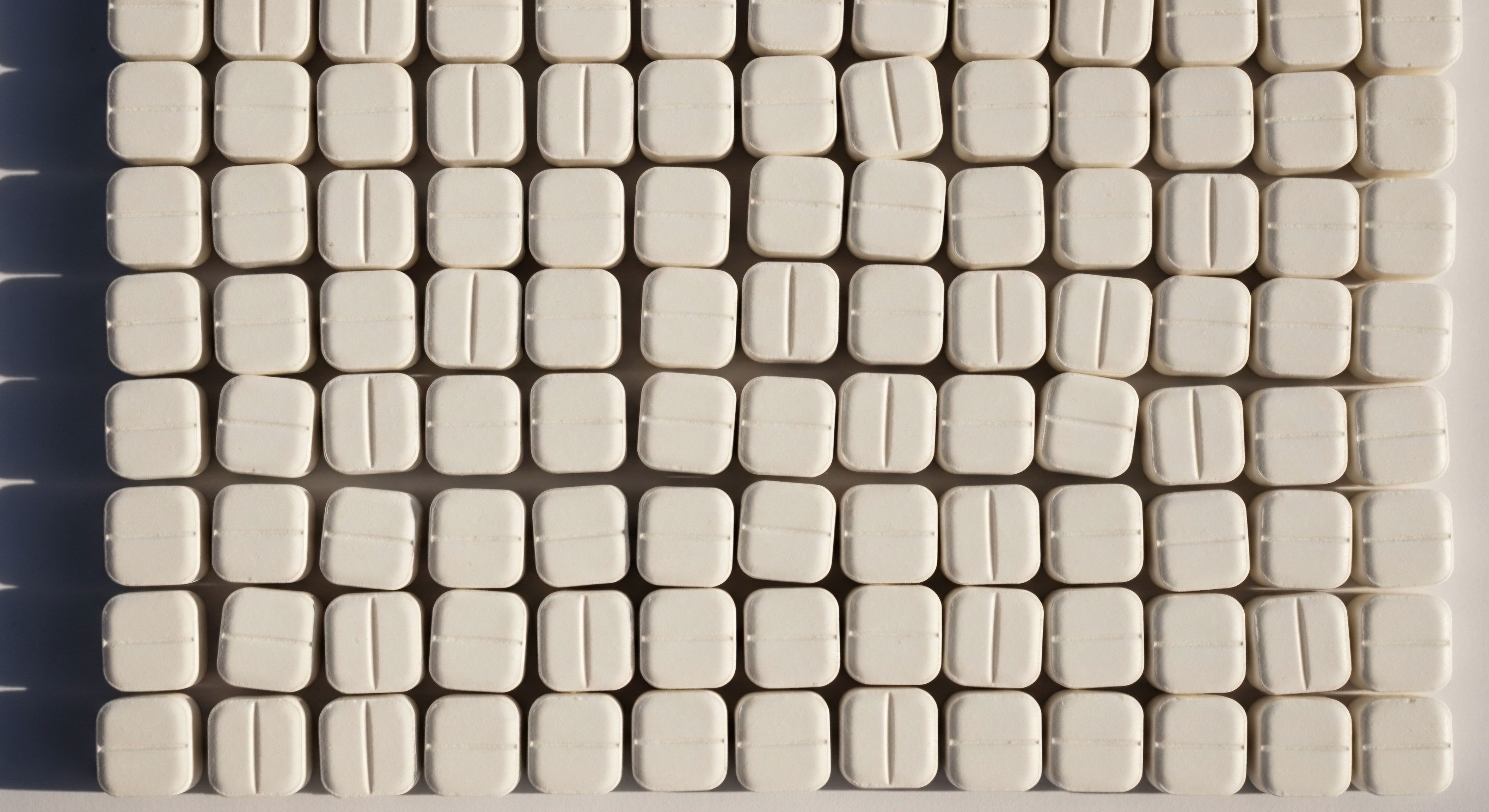

Fundamentals
Many individuals recognize a subtle yet persistent erosion of their inherent vitality, experiencing shifts in energy, mood, and physical resilience that often defy easy explanation. This profound lived experience, a quiet diminishing of one’s full capacity, frequently prompts a deeper inquiry into the intricate internal messaging systems of the human body, particularly the endocrine network.
When considering a structured approach to biochemical recalibration, such as a hormonal optimization protocol, a critical distinction emerges ∞ the difference between simply receiving therapeutic agents and genuinely integrating them into one’s physiological landscape.
Understanding your own biological systems represents the foundational step toward reclaiming robust function. The endocrine system, a sophisticated orchestra of glands and hormones, orchestrates virtually every bodily process, from metabolism and mood to growth and reproduction. Hormones function as precise chemical messengers, transmitting instructions that regulate cellular activity across diverse tissues. Any disruption in this delicate equilibrium can precipitate a cascade of symptoms, manifesting as fatigue, cognitive haziness, alterations in body composition, or diminished libido.
Reclaiming robust physiological function begins with a profound understanding of one’s own intricate biological systems.

The Endocrine System an Orchestrated Symphony
The human endocrine system operates as a highly interconnected communication network, with glands secreting hormones directly into the bloodstream. These hormones then travel to target cells possessing specific receptors, initiating a precise cellular response. The hypothalamic-pituitary-gonadal (HPG) axis, for example, represents a primary regulatory pathway governing reproductive and metabolic health.
Gonadotropin-releasing hormone (GnRH) from the hypothalamus stimulates the pituitary gland to release luteinizing hormone (LH) and follicle-stimulating hormone (FSH), which subsequently act on the gonads to produce testosterone or estrogen. Disruptions along this axis, often influenced by external stressors, can profoundly alter hormonal output.
The intricate feedback loops within this system ensure homeostatic balance. Elevated levels of certain hormones can signal the hypothalamus or pituitary to reduce their stimulatory output, thereby preventing overproduction. Conversely, insufficient hormonal concentrations prompt an increase in stimulatory signals. This dynamic regulatory mechanism underscores the sensitivity of the endocrine system to both internal and external influences, making it highly responsive to lifestyle factors.


Intermediate
For individuals pursuing hormonal optimization, the efficacy of prescribed protocols hinges not solely on the pharmacological agents themselves, but significantly on the individual’s daily habits and physiological milieu. Lifestyle factors serve as potent modulators of endocrine function, influencing everything from receptor sensitivity to hormone synthesis and clearance. Adherence, in this context, extends beyond merely taking medication; it signifies a comprehensive commitment to supporting the body’s recalibration through congruent daily practices.

How Lifestyle Factors Intersect with Hormonal Protocols?
The interplay between lifestyle and hormonal balance represents a dynamic equilibrium. Consider testosterone replacement therapy (TRT) for men experiencing symptoms of low testosterone. A standard protocol often involves weekly intramuscular injections of Testosterone Cypionate, alongside Gonadorelin to sustain natural production and Anastrozole to manage estrogen conversion.
The ultimate success of this intervention is profoundly shaped by concurrent lifestyle choices. Poor sleep hygiene, for example, can counteract the therapeutic benefits by disrupting circadian rhythms and exacerbating systemic inflammation, both of which negatively impact androgen receptor sensitivity and overall metabolic health.
Lifestyle factors serve as powerful modulators of endocrine function, significantly impacting the efficacy of hormonal optimization protocols.

Nutritional Strategies for Endocrine Support
Nutritional intake profoundly influences hormonal pathways. A diet rich in micronutrients and healthy fats provides the essential building blocks for hormone synthesis, while concurrently supporting metabolic health. Conversely, chronic consumption of processed foods and refined sugars can lead to insulin resistance and systemic inflammation, creating an unfavorable environment for hormonal equilibrium. For women undergoing testosterone replacement with Testosterone Cypionate, often alongside progesterone, maintaining stable blood glucose levels through balanced nutrition can mitigate mood fluctuations and enhance overall therapeutic responsiveness.
- Macronutrient Balance ∞ Adequate protein intake supports muscle synthesis and neurotransmitter production.
- Healthy Fats ∞ Cholesterol, derived from dietary fats, serves as the precursor for all steroid hormones.
- Micronutrient Density ∞ Vitamins D and B, along with minerals like zinc and magnesium, act as cofactors in numerous enzymatic reactions critical for hormone metabolism.

Physical Activity and Hormonal Responsiveness
Regular, appropriately structured physical activity is a powerful endocrine stimulant. Resistance training, in particular, can enhance insulin sensitivity, support lean muscle mass, and positively influence growth hormone secretion. For those utilizing growth hormone peptide therapy, such as Sermorelin or Ipamorelin / CJC-1295, consistent exercise amplifies the anabolic and regenerative effects, facilitating muscle gain and improved body composition. Sedentary lifestyles, conversely, contribute to insulin resistance, chronic inflammation, and diminished hormonal signaling efficiency, effectively undermining the therapeutic goals of such protocols.
| Lifestyle Factor | Positive Impact on Adherence/Efficacy | Negative Impact on Adherence/Efficacy |
|---|---|---|
| Sleep Quality | Optimizes circadian rhythm, enhances hormone receptor sensitivity, reduces systemic inflammation. | Disrupts cortisol patterns, impairs growth hormone release, increases insulin resistance. |
| Nutritional Density | Provides precursors for hormone synthesis, stabilizes blood glucose, supports metabolic health. | Promotes inflammation, contributes to insulin resistance, depletes micronutrients. |
| Stress Management | Reduces cortisol burden, preserves HPA axis integrity, supports neurotransmitter balance. | Elevates chronic cortisol, suppresses gonadal hormones, depletes adrenal reserves. |
| Physical Activity | Enhances insulin sensitivity, supports muscle anabolism, improves cardiovascular health. | Contributes to sarcopenia, increases visceral adiposity, reduces metabolic rate. |

The Role of Stress Modulation in Protocol Outcomes
Chronic psychological stress profoundly impacts the hypothalamic-pituitary-adrenal (HPA) axis, leading to sustained elevations in cortisol. This sustained cortisol elevation can antagonize the effects of sex hormones, diminish thyroid function, and contribute to insulin resistance.
Individuals undergoing any form of hormonal support, including those on Post-TRT protocols involving Gonadorelin, Tamoxifen, and Clomid, find that effective stress management strategies significantly improve their physiological responsiveness and overall well-being. Techniques such as mindfulness, deep breathing exercises, and maintaining social connections serve to modulate the stress response, creating a more receptive internal environment for therapeutic interventions.


Academic
The profound influence of lifestyle factors on the adherence to and efficacy of hormonal optimization protocols extends into the complex interplay of the neuroendocrine-immune (NEI) axis. This tripartite communication network represents a sophisticated system of checks and balances, where chronic perturbations in one component invariably ripple through the others, directly impacting the bioavailability, receptor affinity, and downstream signaling of exogenous hormones.
Understanding this intricate crosstalk at a molecular and cellular level provides a comprehensive framework for appreciating why lifestyle is not merely supportive, but fundamentally integral to therapeutic success.

Neuroendocrine-Immune Crosstalk and Hormonal Responsiveness
The NEI axis orchestrates the body’s adaptive responses to both internal and external stressors. The hypothalamus, through its release of corticotropin-releasing hormone (CRH), initiates the stress response, culminating in adrenal cortisol secretion. Sustained activation of this pathway, a common consequence of chronic psychological stress or sleep deprivation, leads to a persistent inflammatory state.
Inflammatory cytokines, such as IL-6 and TNF-alpha, are known to directly interfere with androgen and estrogen receptor signaling, reducing their efficacy even in the presence of optimized hormone levels. This phenomenon, often termed “hormone resistance,” explains why some individuals, despite receiving appropriate dosages of testosterone or estradiol, report persistent symptoms.
Consider the implications for individuals undergoing growth hormone peptide therapy, utilizing agents like Tesamorelin or Hexarelin. These peptides stimulate endogenous growth hormone release, which in turn influences IGF-1 production and downstream anabolic pathways. Chronic inflammation, however, can impair hepatic IGF-1 synthesis and reduce peripheral tissue responsiveness to growth hormone, thereby diminishing the therapeutic yield of these potent compounds.
The meticulous management of systemic inflammation through anti-inflammatory dietary patterns, regular physical activity, and robust sleep hygiene thus becomes a direct determinant of treatment success.
Chronic perturbations within the neuroendocrine-immune axis profoundly impact hormone receptor sensitivity and signaling efficacy.

Mitochondrial Health and Endocrine Energetics
At the cellular level, mitochondrial function serves as a critical determinant of hormonal efficacy. Mitochondria, the cellular powerhouses, generate adenosine triphosphate (ATP), the primary energy currency required for hormone synthesis, transport, and receptor activation. Lifestyle factors such as chronic nutrient deficiencies, particularly in B vitamins, magnesium, and CoQ10, directly impair mitochondrial bioenergetics. Oxidative stress, often exacerbated by a sedentary lifestyle and exposure to environmental toxins, further compromises mitochondrial integrity, leading to reduced ATP production and cellular dysfunction.
The synthesis of steroid hormones, for instance, begins with cholesterol, which must be transported into the inner mitochondrial membrane via the steroidogenic acute regulatory (StAR) protein. This process is highly energy-dependent. Compromised mitochondrial function, therefore, can directly impede the initial and rate-limiting steps of steroidogenesis, affecting not only endogenous production but also the cellular machinery required to effectively utilize exogenous hormones.
Protocols involving agents like Enclomiphene, designed to support LH and FSH levels, rely on robust cellular energy production within the Leydig cells to achieve their desired effect.

Gut Microbiome Modulation of Hormonal Metabolism
The gut microbiome, a complex ecosystem of microorganisms, exerts a profound and often underappreciated influence on hormonal metabolism, particularly concerning estrogens. The “estrobolome,” a collection of gut bacteria, produces beta-glucuronidase, an enzyme that deconjugates estrogens in the gut, allowing them to be reabsorbed into circulation.
An imbalanced gut microbiome, characterized by dysbiosis, can lead to altered estrogen reabsorption, potentially contributing to estrogen dominance or insufficient clearance. This dynamic is especially relevant for women on testosterone and progesterone protocols, where optimal estrogen metabolism is paramount for overall balance and symptom management.
Dietary fiber, prebiotics, and probiotics represent key lifestyle interventions capable of modulating the gut microbiome. A diverse, plant-rich diet supports a healthy estrobolome, facilitating appropriate estrogen excretion and reducing the recirculating load. For men on TRT who may also be prescribed Anastrozole to manage estrogen conversion, supporting a healthy gut microbiome can complement the pharmacological intervention by optimizing the body’s natural pathways for estrogen regulation, reducing the reliance on pharmacological inhibition alone.
| Lifestyle Domain | Molecular Mechanism of Impact | Relevance to Protocol Adherence |
|---|---|---|
| Sleep Disruption | Altered circadian gene expression (e.g. CLOCK, BMAL1), increased inflammatory cytokines (IL-6), reduced growth hormone pulsatility. | Diminished receptor sensitivity, impaired anabolic signaling, reduced efficacy of GH peptides. |
| Chronic Stress | Sustained HPA axis activation, elevated cortisol, catecholamine surge, direct antagonism of sex steroid receptors. | Reduced bioavailability of administered hormones, increased catabolism, diminished therapeutic response. |
| Micronutrient Deficiencies | Impaired enzymatic cofactors (e.g. zinc for aromatase, magnesium for ATP), reduced mitochondrial bioenergetics. | Suboptimal hormone synthesis, inefficient receptor binding, reduced cellular utilization of exogenous hormones. |
| Gut Dysbiosis | Altered estrobolome activity (beta-glucuronidase), systemic endotoxemia (LPS), increased inflammatory burden. | Impaired estrogen metabolism, reduced hormone clearance, heightened systemic inflammation affecting receptor function. |

References
- Dumesic, Daniel A. et al. “Endocrine-Metabolic Dysfunction in Polycystic Ovary Syndrome ∞ An Integrated Perspective.” Clinical Endocrinology, vol. 86, no. 6, 2017, pp. 783-792.
- Handelsman, David J. and Stephen J. Dohle. “Long-Term Testosterone Treatment in Men with Age-Related Decline in Testosterone.” The Journal of Clinical Endocrinology & Metabolism, vol. 101, no. 8, 2016, pp. 2886-2895.
- Liu, Hong, et al. “Sleep Deprivation and Hormonal Dysregulation ∞ A Review.” Sleep Medicine Reviews, vol. 46, 2019, pp. 1-13.
- Manna, P. R. and S. Stocco. “The Role of StAR Protein in Steroidogenesis ∞ Regulation and Function.” Journal of Molecular Endocrinology, vol. 32, no. 2, 2004, pp. 327-343.
- O’Keefe, John H. et al. “Impact of the Western Diet on the Gut Microbiome and Its Implications for Metabolic Syndrome.” Circulation Research, vol. 124, no. 10, 2019, pp. 1442-1454.
- Veldhuis, Johannes D. et al. “Pulsatile Growth Hormone Secretion and Its Regulation ∞ An Overview.” Journal of Clinical Endocrinology & Metabolism, vol. 86, no. 8, 2001, pp. 3501-3507.
- Walton, John C. et al. “Lifestyle Factors and Adherence to Medical Therapies ∞ A Review.” Patient Preference and Adherence, vol. 12, 2018, pp. 1027-1039.

Reflection
The journey toward hormonal optimization represents a deeply personal endeavor, one that extends far beyond the confines of a prescription. The knowledge presented here, elucidating the intricate connections between your daily choices and your body’s internal chemistry, serves as a powerful initial step.
Understanding these biological systems empowers you to become an active participant in your own well-being, moving from passive recipient to informed co-creator of your health trajectory. Your unique physiology demands a personalized path, and this comprehensive understanding forms the bedrock upon which genuine, lasting vitality can be meticulously constructed.



